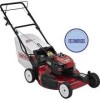Craftsman 37624 Owners Manual - Page 19
a Sears, Parts, Center., PROBLEM, CAUSE, CORRECTION
 |
View all Craftsman 37624 manuals
Add to My Manuals
Save this manual to your list of manuals |
Page 19 highlights
ENGINE FUEL SYSTEM IMPORTANT: It is important to prevent gum deposits from forming in essential fuel system parts such as carburetor, fuel filter, fuel hose, or tank during storage. Alcohol blended fuels (called gasohol or using ethanol or methanol) can attract moisture which leads to separation and formation of acids during storage. Acidic gas can damage the fuel system of an engine while in storage. • Empty the fuel tank by starting the engine and letting it run until the fuel lines and carburetor are empty. • Never use engine or carburetor cleaner products in the fuel tank or permanent damage may occur. • Use fresh fuel next season. NOTE: Fuel stabilizer is an acceptable alternative in minimizing the formation of fuel gum deposits during storage. Add stabilizer to gasoline in fuel tank or storage container. Always follow the mix ratio found on stabilizer container. Run engine at least 10 minutes after adding stabilizer to allow the stabilizer to reach the carburetor. Do not empty the gas tank and carburetor if using fuel stabilizer. ENGINE OIL Drain oil (with engine warm) and replace with clean engine oil. (See "ENGINE" in the Maintenance section of this manual). CYLINDER 1. Remove spark plug. 2. Pour one ounce (29 ml) of oil through spark plug hole into cylinder. 3. Pull starter handle slowly a few times to distribute oil. 4. Replace with new spark plug. BATTERY Disconnect the battery from the engine connector and charge battery 48 hours. OTHER • Do not store gasoline from one season to another. • Replace your gasoline can if your can starts to rust. Rust and/or dirt in your gasoline will cause problems. • If possible, store your unit indoors and cover it to protect it from dust and dirt. • Cover your unit with a suitable protective cover that does not retain moisture. Do not use plastic. Plastic cannot breathe, which allows condensation to form and will cause your unit to rust. IMPORTANT: Never cover mower while engine and exhaust areas are still warm. ,I_CAUTION: Never store the lawn mower with gasoline in the tank inside a building where fumes may reach an open flame or spark. Allow the engine to cool before storing in any enclosure. TROUBLESHOOTING =See appropriate to a Sears Parts & Repair Center. PROBLEM CAUSE section in manual unless directed CORRECTION Does not start . Dirty air filter. 2. Out of fue!. 3. Stale fuel. 4. Water in fuel. 5. Spark plug wire is disconnected. 6. Bad spark plug. 7. Loose blade or broken blade adapter. 8. Control bar in released position. 9. Control bar defective. 10. Fuel valve lever (if so equipped) in OFF position. 11. Weak battery (if equipped). 12. Disconnected battery connector (if equipped). 13. Blown fuse (if equipped). . Clean/replace air filter. 2. Fill fuel tank. 3. Empty fuel tank and refill tank with fresh, clean gasoline. 4. Empty fuel tank and refill tank with fresh, clean gasoline. 5. Connect wire to plug. 6. Replace spark plug. 7. Tighten blade bolt or replace blade adapter. 8. Depress control bar to handle. 9. Replace control bar. 10. Turn fuel valve lever to the ON position. 11. Charge battery. 12. Connect battery to engine. 13. Replace fuse. 19















